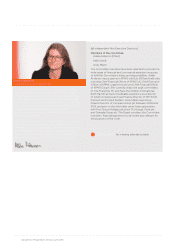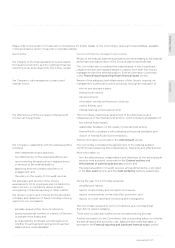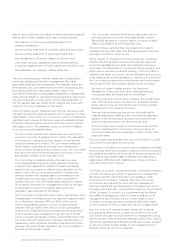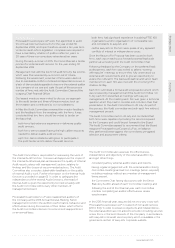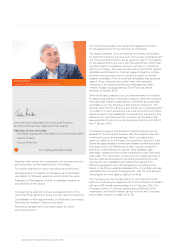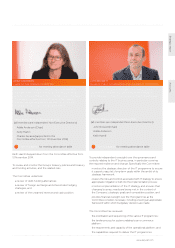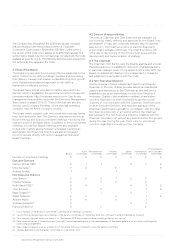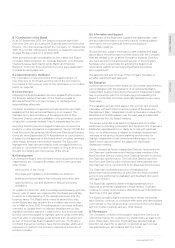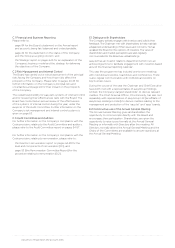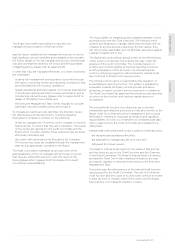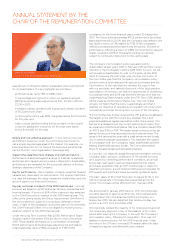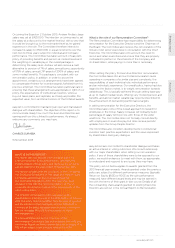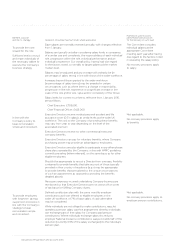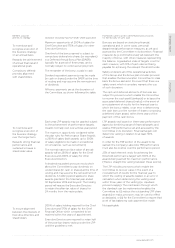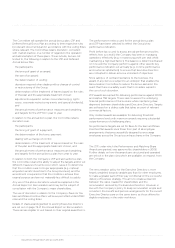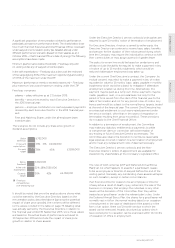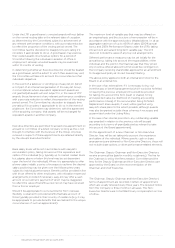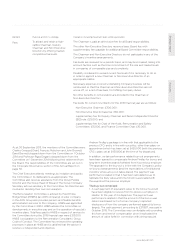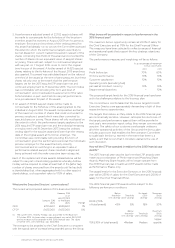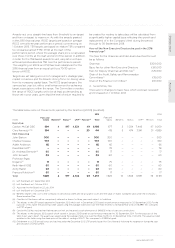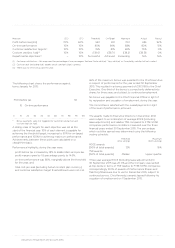EasyJet 2015 Annual Report Download - page 68
Download and view the complete annual report
Please find page 68 of the 2015 EasyJet annual report below. You can navigate through the pages in the report by either clicking on the pages listed below, or by using the keyword search tool below to find specific information within the annual report.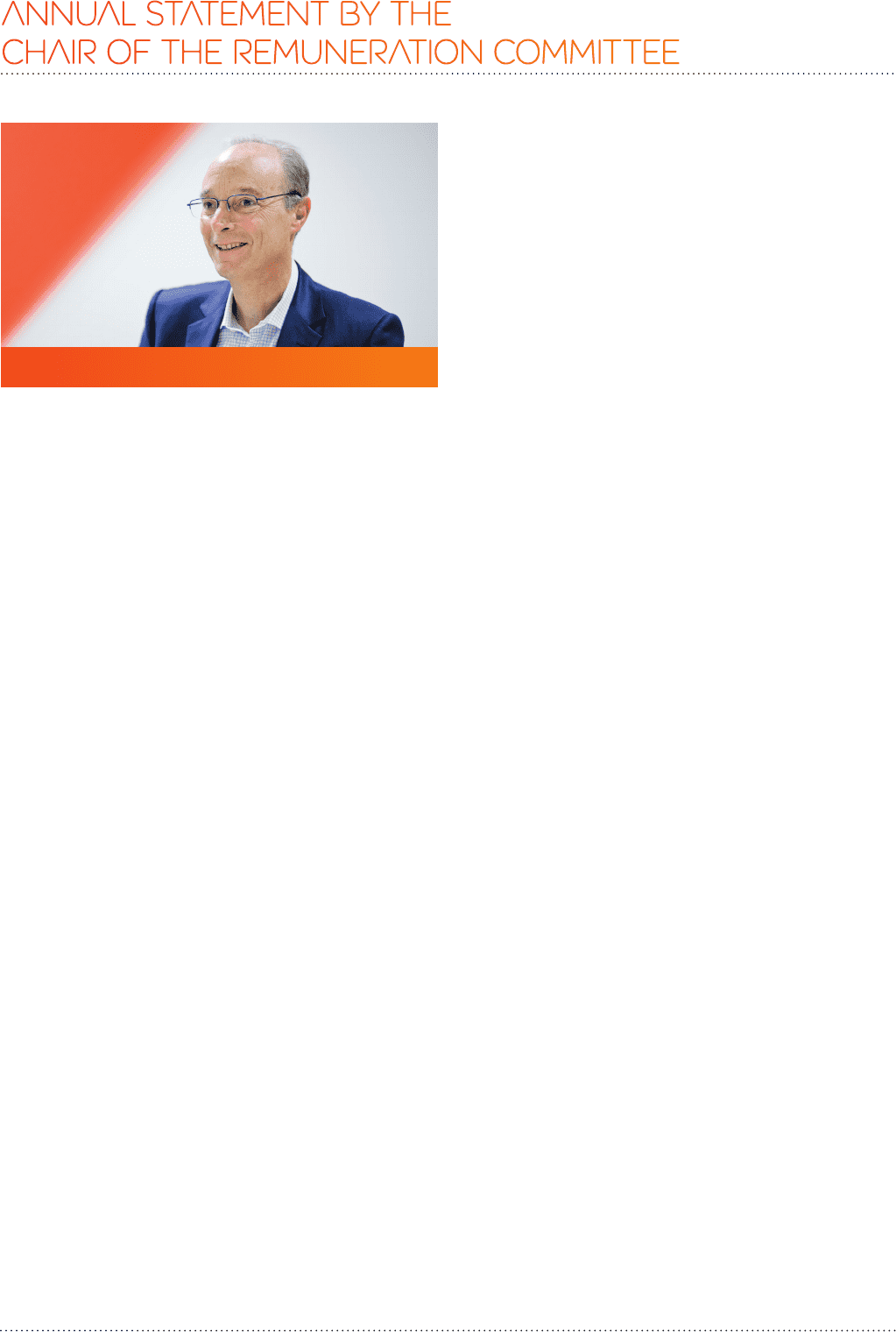
64 easyJet plc Annual report and accounts 2015
Directors’ remuneration report
Annual statement by the
chair of the remuneration committee
CHARLES GURASSA,
CHAIR OF THE REMUNERATION COMMITTEE
Performance of the Group in the 2015 financial year
easyJet has continued to deliver sustainable returns and growth
for its shareholders. The key highlights are as follows:
• profit before tax up by 18% to £686 million;
• 1.7 percentage point growth in return on capital employed
(ROCE) (including lease adjustments) from 20.5% in 2014 to
22.2% in 2015;
• increased ordinary dividend with a proposed ordinary dividend
of 55.2 pence per share;
• on-time performance was 80%, marginally above the threshold
for the year; and
• total cost per seat (excluding fuel at constant currency) and
customer satisfaction outcomes for the year were below
bonus thresholds for the year.
Aligning remuneration policy with Company principles
Simple and cost-effective approach – In line with our low-cost
and efficient business model, the Committee has chosen to
set a simple pay package against the market. For example, our
Executive Directors do not receive the Executive benefits that
can be found in most organisations (see page 66).
Support the stated business strategy of growth and returns –
Performance is assessed against a range of financial, operational
and longer-term targets ensuring value is delivered to shareholders,
and Directors are rewarded for the successful delivery of the key
strategic objectives of the Company.
Pay for performance – Remuneration is heavily weighted towards
variable pay, dependent on performance. This ensures that there
is a clear link between the value created for shareholders and the
amount paid to our Executive Directors.
Key pay outcomes in respect of the 2015 financial year – Annual
bonuses are based on profit before tax and key operational and
financial targets. A bonus of 66% of the maximum was awarded
to the Chief Executive in respect of the 2015 financial year. This
reflects the strong results the Group has achieved. One-third of
the bonus earned is subject to compulsory deferral for three
years. In light of the resignation during the year of Chris Kennedy,
the Chief Financial Officer, he is not eligible to receive a bonus
award in respect of the 2015 financial year.
Under the Long Term Incentive Plan (LTIP), Performance Share
Awards made in December 2012 are due to vest in December
2015. These awards are based on a combination of average
ROCE performance (including lease adjustments) and relative
total shareholder return (TSR) compared to FTSE 51-150
companies for the three financial years ended 30 September
2015. The Group achieved average ROCE performance (including
lease adjustments) of 20.0%, and the Company was ranked in the
top decile in terms of TSR relative to FTSE 51-150 companies,
reflecting exceptional performance over the period. This level of
performance, reflecting a return of 236% for investment in easyJet
shares, resulted in 100% of the awards vesting successfully,
subject to continued employment to the vesting date.
Remuneration policy for the 2016 financial year
The Company’s remuneration policy was approved by
shareholders at last year’s AGM in February 2015 and the current
intention is that it will apply until the 2018 AGM. As such, we will
not be asking shareholders to vote on the policy at the 2016
AGM. In reviewing the policy last year, one key conclusion of
the Committee was that the Company’s remuneration policy
should continue to be aligned with easyJet’s principles and the
Committee is of the view that this remains the case. In line
with our principles, and taking full account of the ‘best practice’
expectations of investors, we took the opportunity of simplifying
our arrangements and 2015 was therefore the last time that we
made Matching Share Awards under the LTIP. From 2016, awards
will be made as Performance Shares only. The Committee
remains confident that the policy is appropriate and that it
satisfies our objective to operate a remuneration structure which
successfully promotes the long-term success of the Company.
The Committee has further reviewed the LTIP and has recalibrated
the targets in line with the current key strategic focus and
projected additional capital expenditure within the business. This
has led to a rebalancing of the current performance metric from
an equal split of ROCE and relative TSR to a condition based 70%
on ROCE and 30% on TSR. The target range continues to be set
taking into account internal projections and external views. The
range is the same as last year with a small enhancement to pay
out on achieving target expectations. This has been the subject
of consultation with the Company’s major shareholders and the
leading shareholder advisory bodies. The Committee believe
these to be appropriate and demanding targets.
In summary, our relatively straightforward remuneration consists
of a base salary, pension contribution of 7%, benefit provision
and, subject to stretching performance conditions, an annual
bonus plan, part paid in cash and part deferred into shares,
and shares awarded under an LTIP. Incentive pay is subject to
clawback provisions, a post-vesting holding period operates for
LTIP awards and significant share ownership guidelines apply.
The basic salary of the Chief Executive increased by 1%, in line
with the typical rate of increase being awarded across the
Group. The increase will be effective from 1 January 2016.
Changes to the Board
We announced in January 2015 that our CFO, Chris Kennedy,
would be leaving to take up another role. Chris subsequently
stepped down from the Board and left the Company on 1
September 2015. We are delighted that Andrew Findlay has
joined us as CFO from 2 October 2015.
Chris Kennedy worked the majority of his notice period and will
not receive any payment in lieu of the balance of his notice
period after leaving the Company. In line with the Company’s
remuneration policy, following his resignation, Chris was not
eligible to receive a bonus for the 2015 financial year. Under
the rules of the LTIP, any unvested LTIP awards after the date
of departure lapsed, and all benefits also ceased.


